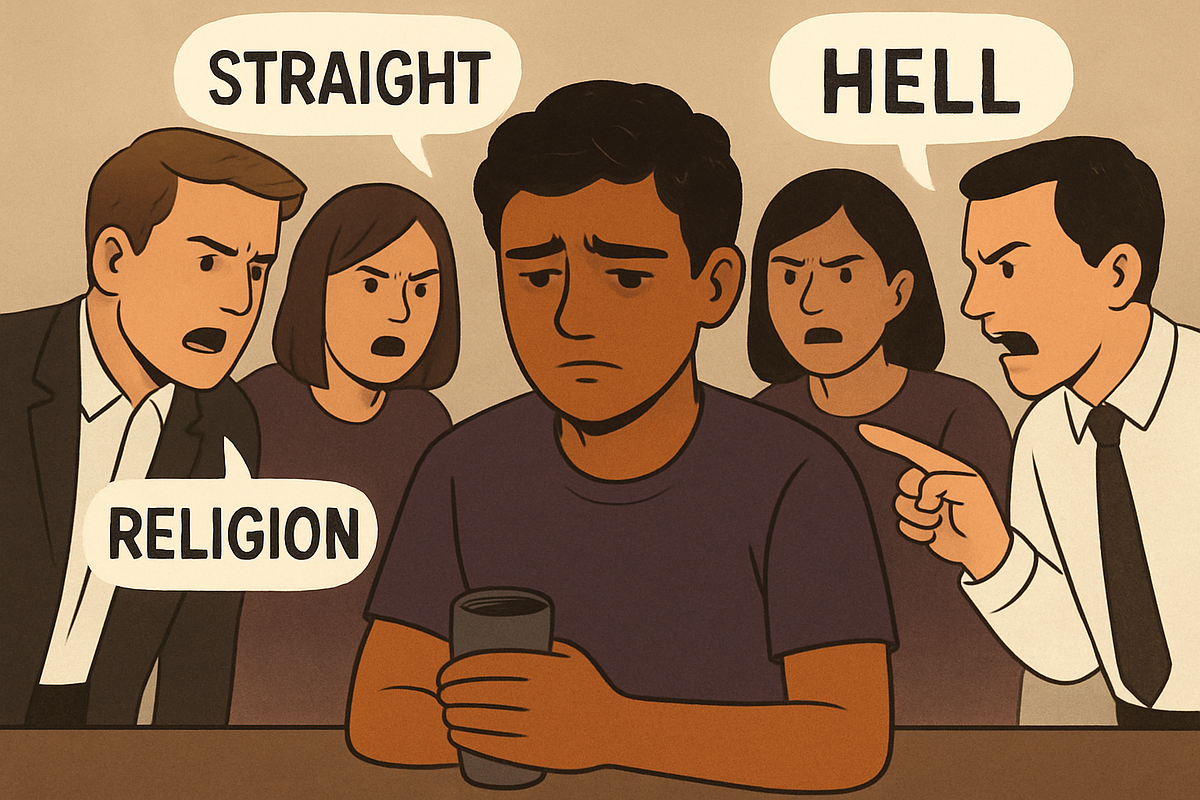When Jokes Cross the Line: The Day My Colleagues Tried to “Fix” Me | by Mas Teki | Aug, 2025

It happened on a Friday.
A day that started like any other, work, deadlines, lunch with colleagues, until it turned into one of the most painful experiences I’ve ever had in my professional life.
We had just finished lunch and were sitting together, talking casually. Nothing out of the ordinary. Then, without warning, one of my colleagues, actually, one of my direct superiors, looked at me and said,
“You need to repent and return to the right path.”
And by “right path,” he meant straight.
He launched into a story he’d heard on a YouTube podcast about a woman who had been married for over ten years but was never touched by her husband. The big reveal? The husband was gay. According to him, the husband “found God” and “became straight again.”
The implication was loud and clear: I could, no, should, be “fixed” too.
Before I could even process that, another colleague jumped in.
“Why don’t you just change religions,” she said, almost casually.
“If you’re going to stay Muslim but rarely pray, and on top of that you’re gay… well, you’re definitely going to hell. The deepest one, the seventh layer.”
She then went on to “helpfully” suggest alternatives: other religions where the commitment was supposedly easier.
“Some only need to worship once a week. Some twice a month. Some even once a year,” she explained, as if she were offering me a more flexible phone plan.
Another voice chimed in.
“You know, what you’re doing will drag your parents to hell too.”
And it didn’t stop there.
The same ideas, the same judgments, kept circling the table for forty minutes.
Sometimes it was a direct comment. Sometimes it was a laugh.
Sometimes it was silence, but the kind of silence that feels like agreement.
I just sat there, taking it in.
The words were sharp, deliberate, and relentless.
They weren’t teasing. They weren’t joking. They were telling me, in every possible way, that who I am is wrong. That my faith is invalid. That my existence is shameful.
At first, I tried to stay calm. I smiled, like I usually do when people poke at me. But this was different. This wasn’t playful banter. This was a coordinated attack on my identity, my beliefs, and even my family.
Something in me snapped.
I slammed my tumbler on the table, hard.
I told them straight:
“This isn’t a joke anymore. This is personal. This is an attack.”
The room went silent.
For a second, they looked surprised.
Maybe they thought I’d just take it, like I always do.
Maybe they thought I’d never fight back.
Later, a few of them apologized. But others acted as if nothing happened, as if they hadn’t just tried to “correct” my existence for almost an hour.
Since that day, I’ve kept my distance. I avoid small talk. I eat lunch alone. Not because I’m weak, but because I need to protect my peace. Being around them feels like sitting in the same room with people who have already decided you are less than them. People who think they are entitled to dictate your life, your faith, and your identity.
I’m sharing this because there are too many people out there like me, people who sit in silence while others chip away at their dignity under the guise of “care” or “religion” or “jokes.”
This isn’t harmless teasing. This is bullying. This is emotional violence.
If you’ve ever done something like this to someone, I want you to understand, you’re not helping. You’re not “guiding” them. You’re not saving their soul. You’re telling them they are broken, and you’re doing it in front of an audience.
And if you’ve been on the receiving end of this?
You’re not broken. You don’t need fixing. Your existence doesn’t need permission.
Sometimes, the bravest thing you can do is to say:
“That’s not okay. You’ve crossed the line.”
Even if your hands are shaking. Even if your voice cracks. Even if you have to slam your tumbler on the table to make them hear you.
Because the truth is, the line isn’t just for you.
It’s for all the “me”s out there, silently hoping someone, anyone, will stand up and say enough.
If this story resonates with you, whether you’ve lived it, witnessed it, or unknowingly contributed to it, I ask you to pause before you speak next time. Ask yourself: Am I offering kindness, or am I disguising cruelty as concern?
Because one “harmless” conversation can live rent-free in someone’s mind for years, not as a lesson, but as a scar.


